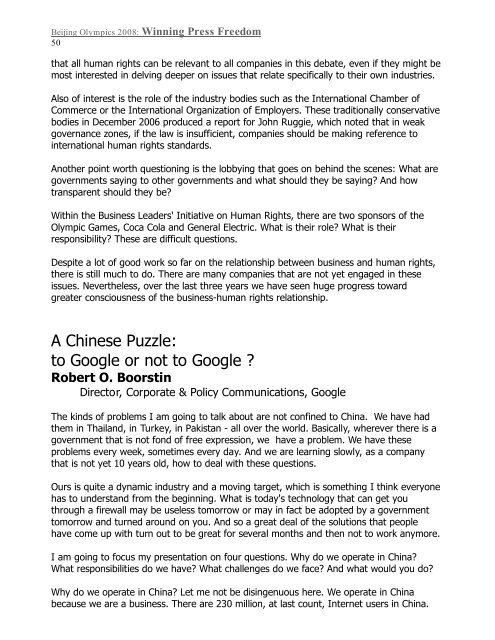Beijing Olympics 2008: Winning Press Freedom - World Press ...
Beijing Olympics 2008: Winning Press Freedom - World Press ...
Beijing Olympics 2008: Winning Press Freedom - World Press ...
Create successful ePaper yourself
Turn your PDF publications into a flip-book with our unique Google optimized e-Paper software.
<strong>Beijing</strong> <strong>Olympics</strong> <strong>2008</strong>: <strong>Winning</strong> <strong>Press</strong> <strong>Freedom</strong><br />
50<br />
that all human rights can be relevant to all companies in this debate, even if they might be<br />
most interested in delving deeper on issues that relate specifically to their own industries.<br />
Also of interest is the role of the industry bodies such as the International Chamber of<br />
Commerce or the International Organization of Employers. These traditionally conservative<br />
bodies in December 2006 produced a report for John Ruggie, which noted that in weak<br />
governance zones, if the law is insufficient, companies should be making reference to<br />
international human rights standards.<br />
Another point worth questioning is the lobbying that goes on behind the scenes: What are<br />
governments saying to other governments and what should they be saying? And how<br />
transparent should they be?<br />
Within the Business Leaders' Initiative on Human Rights, there are two sponsors of the<br />
Olympic Games, Coca Cola and General Electric. What is their role? What is their<br />
responsibility? These are difficult questions.<br />
Despite a lot of good work so far on the relationship between business and human rights,<br />
there is still much to do. There are many companies that are not yet engaged in these<br />
issues. Nevertheless, over the last three years we have seen huge progress toward<br />
greater consciousness of the business-human rights relationship.<br />
A Chinese Puzzle:<br />
to Google or not to Google ?<br />
Robert O. Boorstin<br />
Director, Corporate & Policy Communications, Google<br />
The kinds of problems I am going to talk about are not confined to China. We have had<br />
them in Thailand, in Turkey, in Pakistan - all over the world. Basically, wherever there is a<br />
government that is not fond of free expression, we have a problem. We have these<br />
problems every week, sometimes every day. And we are learning slowly, as a company<br />
that is not yet 10 years old, how to deal with these questions.<br />
Ours is quite a dynamic industry and a moving target, which is something I think everyone<br />
has to understand from the beginning. What is today's technology that can get you<br />
through a firewall may be useless tomorrow or may in fact be adopted by a government<br />
tomorrow and turned around on you. And so a great deal of the solutions that people<br />
have come up with turn out to be great for several months and then not to work anymore.<br />
I am going to focus my presentation on four questions. Why do we operate in China?<br />
What responsibilities do we have? What challenges do we face? And what would you do?<br />
Why do we operate in China? Let me not be disingenuous here. We operate in China<br />
because we are a business. There are 230 million, at last count, Internet users in China.





